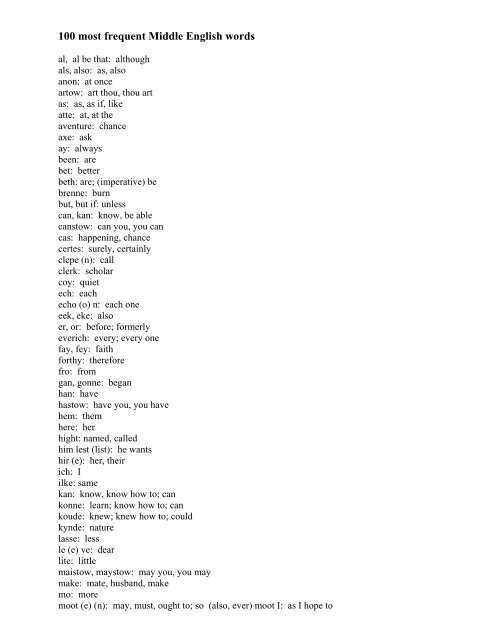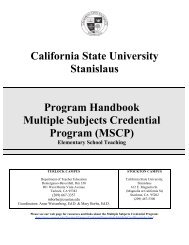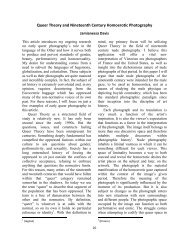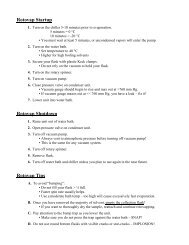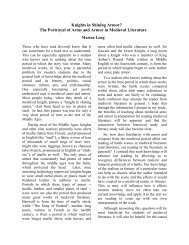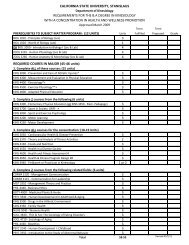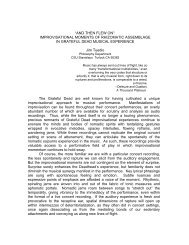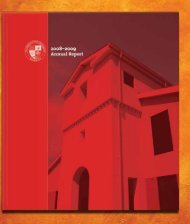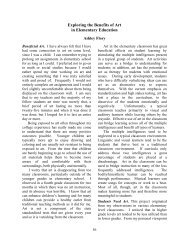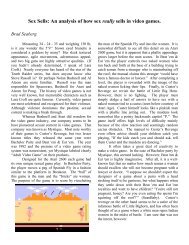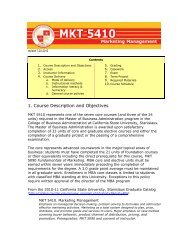100 most frequent Middle English words
100 most frequent Middle English words
100 most frequent Middle English words
You also want an ePaper? Increase the reach of your titles
YUMPU automatically turns print PDFs into web optimized ePapers that Google loves.
<strong>100</strong> <strong>most</strong> <strong>frequent</strong> <strong>Middle</strong> <strong>English</strong> <strong>words</strong><br />
al, al be that: although<br />
als, also: as, also<br />
anon: at once<br />
artow: art thou, thou art<br />
as: as, as if, like<br />
atte: at, at the<br />
aventure: chance<br />
axe: ask<br />
ay: always<br />
been: are<br />
bet: better<br />
beth: are; (imperative) be<br />
brenne: burn<br />
but, but if: unless<br />
can, kan: know, be able<br />
canstow: can you, you can<br />
cas: happening, chance<br />
certes: surely, certainly<br />
clepe (n): call<br />
clerk: scholar<br />
coy: quiet<br />
ech: each<br />
echo (o) n: each one<br />
eek, eke: also<br />
er, or: before; formerly<br />
everich: every; every one<br />
fay, fey: faith<br />
forthy: therefore<br />
fro: from<br />
gan, gonne: began<br />
han: have<br />
hastow: have you, you have<br />
hem: them<br />
here: her<br />
hight: named, called<br />
him lest (list): he wants<br />
hir (e): her, their<br />
ich: I<br />
ilke: same<br />
kan: know, know how to; can<br />
konne: learn; know how to; can<br />
koude: knew; knew how to; could<br />
kynde: nature<br />
lasse: less<br />
le (e) ve: dear<br />
lite: little<br />
maistow, maystow: may you, you may<br />
make: mate, husband, make<br />
mo: more<br />
moot (e) (n): may, must, ought to; so (also, ever) moot I: as I hope to
morewe: morrow, morning<br />
mowe: may<br />
muche (1): much, many (a)<br />
nam: am not<br />
namo, namoore, no more<br />
nas: was not<br />
nat: not<br />
nathelees: nevertheless<br />
ne: not, nor<br />
nere: were not<br />
nolde: would not<br />
nones, nonys: occasion<br />
noon: none, no<br />
noot: know not<br />
nyce: foolish<br />
nys: is not<br />
o, oo, on, oon, that oon: one<br />
of: of; off<br />
pardee: (lit. “by God”), a common oath; certainly<br />
prime, pryme: 9 A.M.<br />
quod: said<br />
rathe: early, soon<br />
rede: advise; interpret; read<br />
seistow: you say<br />
sely: innocent, simple<br />
seyde: said<br />
seye: say<br />
shaltow: you shall<br />
sikerly: certainly, surely, truly<br />
sith: since; then<br />
somdel: somewhat<br />
sooth, soothfastnesse, sothe: truth<br />
swich: such<br />
syn: since<br />
than (ne): then, than<br />
thilke: this, that, at that<br />
tho: those; then<br />
tweye: two<br />
unnethe (s): scarcely<br />
verray: true, veritable<br />
wene, -eth: think, thinks<br />
whylom: once, once upon a time, formerly<br />
wight: person, thing<br />
yaf: gave<br />
ycleped: named<br />
ye (n): eye (s)<br />
yeve, -en, -est, -eth: give, given<br />
ynogh: enough<br />
ywis: surely, certainly
Knight’s Tale, I and II<br />
asterte: escape<br />
brydel, bridil: bridle, reins<br />
chere, cheer(e), chiere: face, facial expression<br />
despit(e), dispit: disdain, scorn<br />
gentil(e): noble, well-born<br />
hente(n): seize, grasp<br />
lystes: jousting or tilting fields; enclosed grounds for formal combat<br />
maugre(e), malgre: despite, in spite of<br />
mottelee: multi-colored; patchwork<br />
parfit: perfect; complete<br />
pyne: pain, harm, misery, suffering<br />
socour(e), sokour: succor, help<br />
sote, soot(e): sweet-smelling<br />
sterve(n): die<br />
steven(e): voice, sound<br />
trew(e): true, faithful<br />
weylaway, wailaway, etc.: alas!<br />
waymentyng(e): lamentation<br />
wepne, wepen(e): weapon(s)<br />
wood(e), wod(e): mad, crazy<br />
The Miller’s Tale<br />
Know the c and e <strong>words</strong>, above, in addition to the vocabulary below<br />
cherl: common man, peasant, ruffian<br />
cokewold: cuckold<br />
daungerous: standoffish, aloof, fastidious<br />
deerne: secret<br />
joly, jolyf: merry, cheerful, lusty, amourous<br />
kultour: plough blade<br />
leman, lemman: loved one, paramour, slut<br />
lever(e): preferable, dearer (from “leef” or “life,” dear, beloved)<br />
pryvete(e): privacy, secrecy; secret; private affairs; private (sexual) parts<br />
quite(n): repay; pay back (with a vengeance)<br />
rewe(n): have mercy on; feel pity for<br />
sely: happy, innocent, wretched, insignificant, ignorant<br />
sola(a)s: comfort, pleasure, solace<br />
swynke(n): work<br />
unnethe, unneth, unethe: hardly, scarcely, with difficulty<br />
whether, wether: A male sheep, a ram, a castrated ram<br />
The Reeve’s Tale<br />
Know the f and g <strong>words</strong>, above, in addition to the vocabulary below<br />
grucche: complain (cf. “grouch”)<br />
smoterlich: besmirched, sullied (in reputation)
camus nose, kamus nose: pug nose<br />
capul: horse<br />
cake: loaf of bread<br />
ilhayl: bad luck<br />
warderere: look out behind!<br />
herberwe: lodging<br />
ese: refreshment, food<br />
yexeth: belches<br />
fnorteth: snorts<br />
rowtyng: snoring<br />
pyled: bald<br />
poke: bag<br />
throte-bolle: Adam’s apple<br />
The Wife of Bath’s Prologue<br />
In addition to the vocabulary <strong>words</strong> below, know the high frequency h and i <strong>words</strong><br />
abroche: open<br />
the Apostle: St. Paul<br />
auctoritee, autorite: written authority; an authoritative passage<br />
bishrewe: curse<br />
chaffre, chaffare: merchandise, wares, trade<br />
chepe: buy<br />
costage: expense<br />
engendrure: the act of procreation<br />
geste, geeste: story, history<br />
glose(n): interpret, explain (a text); flatter, deceive<br />
gossib, gossyb, godsib: close friend<br />
hende: courteous, handy, close at hand<br />
kyndely: naturally<br />
maydenhede: virginity<br />
mete(n): dream (mette=a dream)<br />
pleyne, playne: lament, complain<br />
purveyance, purveaunce, purveiaunce: foresight<br />
shende: destroy<br />
soveraynetee, sovereignte: mastery, sovereignty<br />
wexe(n), waxe(n): grow, increase<br />
The Nun’s Priest’s Prologue and Tale<br />
In addition to the vocabulary <strong>words</strong> below, know the high frequency p, q, and r <strong>words</strong><br />
avantour: boaster<br />
biknew(e): makes, knows, confesses<br />
catel: property, possessions<br />
chuk: cluck<br />
gargat: throat<br />
keen, kyne: cows<br />
losengeour: flatterer<br />
pyned: tortured
ecche: interpret, care, be concerned for (“reckon”)<br />
steven(e): voice<br />
sweven(e): dream<br />
woned: dwelled<br />
The Second Nun’s Prologue and Tale<br />
Please also know the high frequency <strong>words</strong> up to and including the t’s<br />
passioun: suffering<br />
herye(n): praise<br />
honestee: chastity<br />
thewes: morals<br />
unwemmed: undefiled<br />
clennesse: purity (clene = pure)<br />
corones: crowns<br />
reneye: renounce<br />
quyken: give life to<br />
lotynge: in hiding<br />
The Canon Yeoman’s Prologue and Tale<br />
slit: “slideth”; slides, slips away<br />
quelle: kill<br />
sublymed: purified<br />
elvysshe: mysterious<br />
multiplicaccioun: transmutation<br />
mollificacioun: softening<br />
induracioun: hardening<br />
Elixer: substance believed to transmute base metals to gold; the “Philosopher’s Stone”<br />
bitymes: soon, quickly<br />
hals: neck<br />
mortifye: harden, make nonvolatile<br />
byjaped: tricked<br />
The Manciple’s Prologue and Tale<br />
At this point in the semester, you should know and have internalized the <strong>100</strong> <strong>most</strong> common <strong>words</strong><br />
in <strong>Middle</strong> <strong>English</strong>. Know the following, as well.<br />
fleen: fleas<br />
queen: whore<br />
hevynesse: drowsiness<br />
ganeth: yawns<br />
fneseth: sneezes<br />
pose: head cold<br />
volage: flighty, foolish<br />
Cokkow: cuckoo (a reference to the cuckold)<br />
montance: value
akel: rash<br />
unavysed: recklessly<br />
wantrust: distrust


